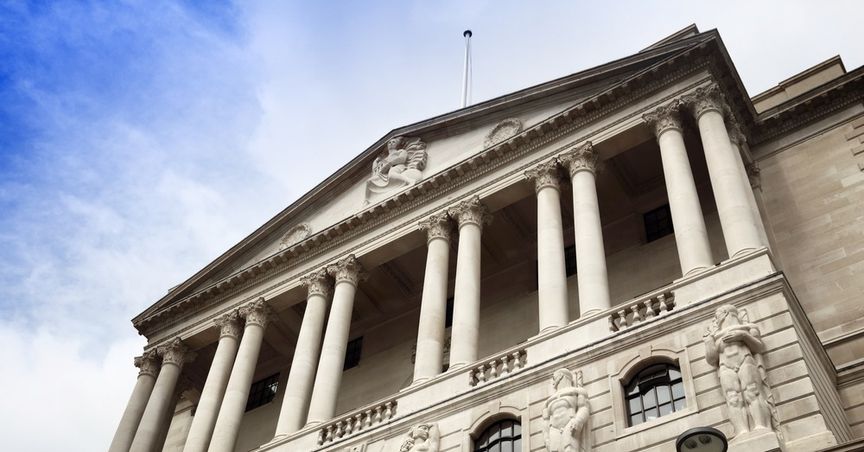Summary
- The chief economist of BOE Andy Haldane believes that the British economy is witnessing a V-shaped recovery since the beginning of May 2020
- Main risk factor that could jeopardize this recovery is the rising unemployment levels across the country
- The biggest support to the recovery would come from a timely availability of corona vaccine, which would contain negative sentiments and push up demand
Elated with the way things have been moving in the past couple of months, the Bank of England (BOE) now believes that the British economy is already on the path of making a sharp V-shaped recovery. Andy Haldane, Chief Economist at the BOE said that the British economy has been consistently growing at the rate of 1 per cent every week since May 2020.
The British economy had witnessed an unprecedented slowdown in business activity levels in the month of April when the country was placed in lockdown to contain the spread of the virus. The economic output dropped by a whopping 20.4 per cent during April 2020 as compared to the same month last year.
To deal with the catastrophic situation, the government had rolled out a number of stimulus measures to help businesses from falling apart and people from losing their jobs and livelihoods. As a result, the UK economy bounced back and by displaying a small positive growth of 1.8 per cent during May 2020, as compared to the same period last year, according to latest government statistics.
The reason to believe that a V-Shaped recovery is taking place
The British economy had shrunk by 2.2 per cent during Q1 2020. This was when hardly any effect of the lockdown could have truncated its growth, as it was imposed on 23 March 2020. Specifically, for the month of March 2020, the economic output dropped by 6.9 per cent, making it one of the sharpest falls recorded in the country in the past four decades. It further dropped by 20.4 per cent during April 2020. During the lockdown, barring a few essential services, the business activity levels of the entire economy came to a standstill for six long weeks.
During this strict lockdown period, however, the government did not allow many businesses to disintegrate and labour to displace by rolling out a series of fiscal stimulus measures for employees and employers, to navigate through the crisis. The principal government schemes -namely the furloughing scheme, the coronavirus business interruption loan scheme and the bounce back loan scheme did cost the British exchequer tens of billions of dollars. But then, they also protected the economy from spiralling into a much deeper economic crisis whose implicit cost would have been several times higher.
Andy Haldane's confidence that a V-shaped recovery is taking place stems from the fact that not all enterprises have disintegrated and labour has been retained in the British economy. Once the producers decide to open their businesses with easier social-distancing restrictions in place, the economic output will shoot up within a short span of time. The pent-up demand built during the lockdown period would provide the initial boost to jump-start the economy, which after a while would become self-sustaining to bring back business activity to pre-pandemic levels.
Voices against Andy Haldane opinion
There are others, however, who do not agree with Andy Haldane’s optimism. His fellow economist from the bank’s Monetary Policy Committee (MPC) Silvana Tenreyro was concerned that the unprecedently high unemployment rates in the country will lead to less spending, and ultimately translate into less demand uptake.
Tenreyro believed that the people sentiments after the outbreak of the pandemic are still quite fragile, and it will be difficult to turnaround immediately. She has even gone on to advise the government to increase spending in its stimulus programmes' to provide further support for the low-income vulnerable groups in the country, and unemployment levels from rising further.
The recovery observed in different sectors so far
There is, however, a significant amount of business activity recovery that has taken place in the country in the past two months since the lockdown was opened. The housing construction sector was the one which has witnessed the maximum rebound since the lockdown ended. The IHS Markit/ CIPS PMI survey for the month of June 2020 has indicated that the industry has actually entered into an expansion phase in just one month since the reopening. The retail industry was reopened and is gradually witnessing a mild rise in footfalls. Hospitality sector is expected to see more sales with government VAT cut announcement recently. Housing demand is also expected to improve with a stamp duty rebate announcement for homes priced below £500,000.
With the opening of air-bridges allowing quarantine free travel between Britain and other nations, there has been a rise in the number of travel inquiries and bookings. In few weeks, the airline and tourism sectors could also well be on a slow but sustainable path to economic recovery.
Vaccine development to aid economic recovery
The pace of recovery of the British economy will be greatly enhanced if the existing vaccine development efforts in the country meet their timelines. Currently, the vaccine development effort led by the Oxford university Jenner institute is the most advanced project in the world and has shown excellent results in initial clinical trial phases. If everything goes on schedule, the doses of the vaccine will be available to the public by September 2020.
The development of a corona vaccine will have economic, health, and psychological gains for the UK. The NHS has been struggling to contain fresh infections in the country. It is expected to witness a sharp decrease in new cases as people receive the potential vaccine. On the economic front, the country would get free of the disease very soon and business activities could be resumed to pre-corona levels rapidly. People will be free of uncertainties and fear of corona infection too, once the vaccine is available.
As a summary, Andy Haldane, Chief Economist, Bank of England believes that the British economy is witnessing a V-shaped recovery since the beginning of May 2020. However, there are others who feel that rising unemployment numbers tell a different story and continued government support is required till consumer demand picks momentum. If the corona vaccine is developed by the Oxford University by September 2020, the economic recovery is likely to come sooner than is being projected.





